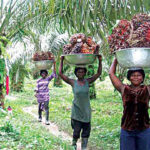The agony of food inflation in Nigeria is no longer news. Several commentators have been propagating ideas towards solving this hydra-headed problem. Chief amongst them is to review current trade policies for essential crops that form the bedrock of the nation’s food basket.
The global event around wheat since the Ukraine-Russia war has left the world short of supply, while the rising climate issue is disrupting rice production in other regions of the world, a situation that has forced India to restrict rice exportation. The conflict on the Red Sea, the protracted El Nino incident, and numerous others are examples of disruptions in the global supply, forcing nations to adopt more strategic measures to achieve food security.
For Nigeria, the situation is multifaceted. We grapple with severe insecurity impacting farms and farmers, the prohibitive cost of input, limited storage and processing infrastructure, and low yields as farmers could not afford the cost of appropriate fertiliser application and quality seeds, to mention a few. Despite these numerous challenges, Nigerian farmers persist in their resilience to make do with the little resources they scrape by.
Nigerians yearn for immediate relief as their incomes can barely suffice to feed them anymore. The National Labour Congress (NLC) strike is a testament to the gnashing cost of living crisis, primarily caused by the rising cost of food engineered by subsidy removal, FX liberalisation, and weak fiscal measures. The urgency required to stem the rising cost of food is one question that is begging for an answer. Nigeria’s approach to the problem needs a novel angle beyond the usual delayed, limited seed distribution and fertilisers that barely reach anywhere.
To address this issue, Nigerian leaders at all levels must devise a better transmission mechanism tol help model an appropriate intervention. They must act with a perfect understanding of all the units that make up the food system and work assiduously to alleviate the issue – from the low-hanging fruit that can bring immediate succour to long-term solutions that can sustainably improve food security.
If well implemented, an average agricultural policy intervention aimed at increasing productivity usually has a lag period of six months before yielding results. The big questions for any proposed intervention, therefore, are: What would the cost of food look like while Nigerians wait for the harvest of the grains we provide input for? Who is tracking the records and the expected yield performance of the improved seed and fertiliser being distributed? What are the off-taker arrangements to measure the impact of the distributed seed? These questions reflect the quality of our approach to solving the food crisis and can help scale intervention more efficiently with evidence-based strategies.
In a recent report, Vestance, an agriculture consultancy firm, highlighted the cost of transportation of goods across the country as one of the contributors to the food crisis. According to the World Bank, transporting food in Nigeria costs five times more than in the US, a situation that should convey a sense of urgency. Solving the transportation challenge is not a quick fix due to the dearth of road infrastructure in Nigeria’s rural areas. However, the state of the road is just a fraction of what constitutes a challenge in transportation. The presence of bribe-seeking police, local levy collectors across LGAs, and numerous security checkpoints significantly increase the cost of transporting food items across the country.
Many business owners were excited at the prospect of train transportation after the last administration’s effort to revive the train system, but the expected impact of moving food across the country is yet to be felt. This is another quick win that can cut time to market and reduce the activities of non-state actors.
Beyond transportation, the government must address the insecurity that has driven many farmers from their land and discouraged commodity traders. Farmers are abandoning their farms in droves and are forced to pay hefty tributes to bandits to access their farmland. Businesses have to contend with meagre returns versus ransom demands, thereby creating additional pressure on the movement of goods from high-production regions to demand areas.
While increasing production might take time to actualise, we can remove a lot of encumbrance on the logistics and transportation of foods across the country and this should significantly reduce time to market, cost and post-harvest loss thereby contributing to the slowdown of food inflation.
Rildwan Bello is the founder of Vestance Limited, a consulting firm helping players in Africa’s agri-food sector unlock their full potential by providing high-quality advisory services.













